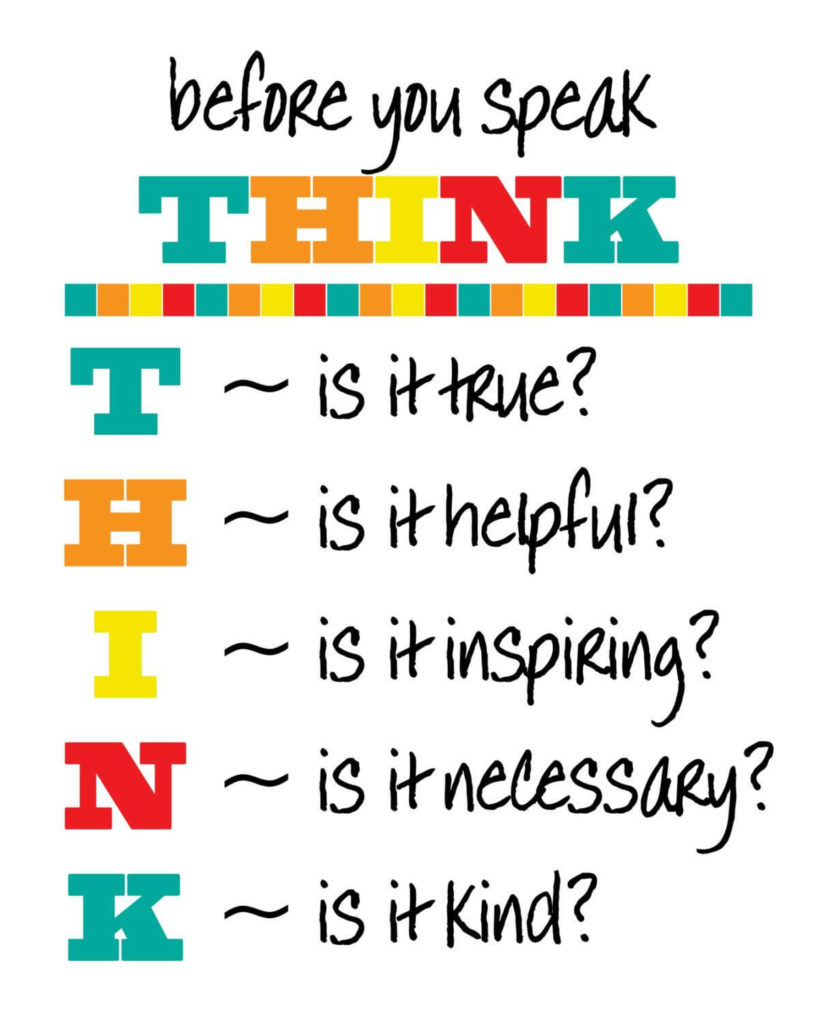T.H.I.N.K. Before You Speak | 6 Reasons Why You Should Think Before You Speak

“Actions speak louder than words”
We’ve all heard this phrase before, right? But have you ever thought about how words are as important as our actions? How simple words can either help someone or hurt someone’s feelings?
Think before you speak. Heard of this phrase before?
I’m sure that we’ve all had moments where we’ve spoken before thinking about our words and soon after we realized our mistake. Words, once spoken, can’t be taken back. It’s okay, though. A part of our nature, really.
When we’re too emotional we tend to forget what we’re saying and to whom. Sometimes, our rational and logical part of the brain shuts down and our emotional part takes lead, making us speak words that we wish we hadn’t spoken.
For all that, some people often speak before they think about it. And while I agree that in some situations being straightforward is good, there are situations where not thinking before speaking can be wrong and harmful.
[Related Read: Are You a Rational Or an Emotional Thinker? Or Both?]
Is It Difficult To Think Before You Speak?
Conversing with your friends, peers, family, co-workers are natural and the flow of the conversation is natural too when we are surrounded by people we know and trust. However, when we feel emotional about something or some topic, we might not retain our ability to think clearly before we speak.
If you can’t seem to think before speaking, don’t beat yourself too much about it. It’s pretty normal. Be that as it may, it is important to remember that effective communication is one of the basic aspects of a healthy and successful relationship whether professional or personal.
For that reason, you must learn to think before you speak about anything to anyone.
But, Does It Even Matter?
It does!
I have a few acquaintances who don’t think before they open their mouths and say the first thing that comes to mind. I remember, one time, I asked one of those acquaintances who is the current prime minister of the United Kingdom – their reply David Cameron. Spoiler Alert! At that time the PM was Theresa May.
Credibility – that matters. When you speak without thinking, you lose credibility. It’s not that the person I was talking to did not know who the PM was but they responded with the first thing that came to mind. They would have answered correctly if they thought about it before speaking.
There are many reasons why a person might speak before thinking:
- Lack of patience
- Lack of good listening skills
- Having an impulsive behavior
To help you with how to think before you speak, here is the T.H.I.N.K. acronym!

Before you speak, T.H.I.N.K! Does your answer meet the above criteria? Is it ‘Yes’ to all these questions? If so, only then speak.
Below, I’ve counted some reasons why you should think before you speak. Bonus! How to think before you speak using the acronym T.H.I.N.K.!
6 Reasons Why you Should Think Before You Speak

1. Your Words Represent You
Before you speak – think. Words are what reflect who you are as a person. What you say reflects your character. For example; You’re a good person at heart but you speak to a server rudely. This behavior will make you, in others’ eyes, a rude character.
2. Words Can Be Hurtful
Words have the power to help others as well as harm others’ feelings. For example; A few decades ago, people used ‘disabled’ or ‘retarded’ to describe someone – kind of hurtful, right? With time, we’ve adopted words such as ‘specially abled’ or ‘a person with special needs’ to describe someone (not as hurtful).
My point is, that words can either make someone feel special or they can make someone feel less than. They have the power to hurt a person – emotionally and mentally. Words hurt when spoken without considering the consequences.
3. Intentions Can Be Different
Assumptions are never good. Your friend is speaking to you about something you did but their intention is not to hurt you but to explain to you what you could have done differently. You, on the other hand, might take their words in the wrong way and lash out at them without thinking through.
Not all people intend to hurt you. Make sure you understand their intentions clearly before responding to their words. Listen before you speak. If you’re not clear about their intentions, ask them. Never assume someone’s intentions. They might differ.
4. Emotions Can Make You Overreact
Again, assumptions can make you overreact and speak without thinking. When we assume what someone said as hurtful, our emotional side takes the front seat and makes us say things we probably don’t mean.
In some cases, our instincts may save our lives but in others, they can cause an emotional outburst resulting in us hurting our loved ones. Remember to think about what you say before you say it.
5. Words Can Affect Actions Too
Actions speak louder than words, true. But the opposite is true too. Our words, often spoken without thinking through, can affect others actions and behaviors. For example; you, in your emotional state, angrily call your friend “stupid”. Your words here might make your friend think that they are not smart.
Words spoken in haste and under emotions – often without thinking – can make the other person lose their self-confidence or self-worth. As I said, words can be hurtful and they can affect others’ actions too.
6. Words Can’t Be Taken Back
My mother often tells me to be careful with my words because once I’ve spoken them out loud, I can’t take them back. I mean, you can apologize for your words but the damage is already done.
No matter how hard you try, apologizing for something you did not mean to say but said anyway is not going to undo the damage already done.
How to think before you speak?
Understanding the reasons why you should think before you speak is the first step. Next comes, how to do it:
1. Wait for 5-10 seconds to think before you speak, especially if you’re angry or emotional. If you can’t think of anything polite to say, it’s always better to stay quiet or walk away.
2. Before you say anything, take a moment to consider the other person’s feelings and where they are coming from. How will your words affect them? What will be the consequences of your actions?
3. Take a mental pause. Take a deep breath, listen to others, and then press play. Instead of reacting instinctively, pause, listen to what the person has said, think about your words, and then do as required.
I hope this article helped you understand the importance of ‘Think Before You Speak’. If you have any questions, you can comment below or write to us at info@calmsage.com. You can also follow us on Facebook or Instagram to stay updated on our content.
“Thinking doesn’t hurt. Words Do. Words have the power to heal. Words have the power to kill.” – Anna Maledon
Take Care!




















